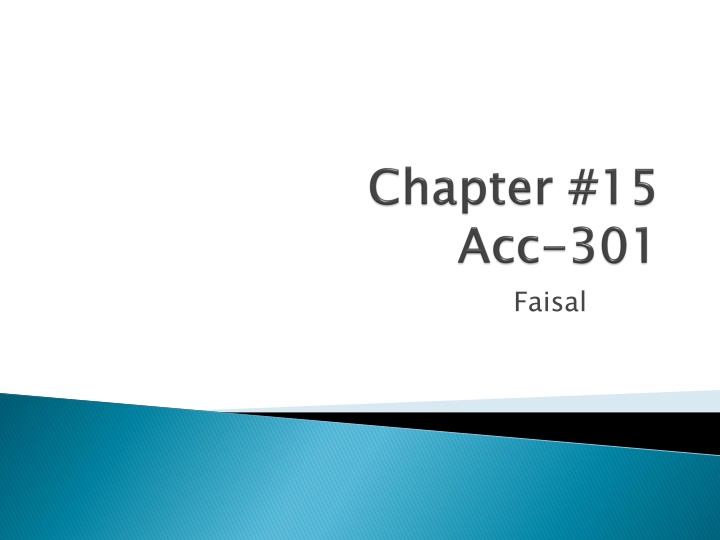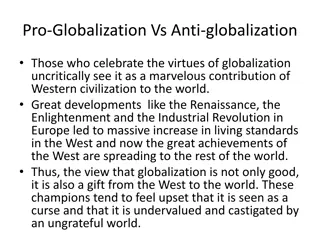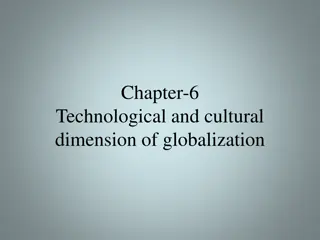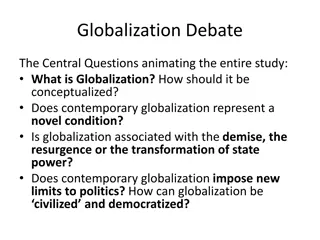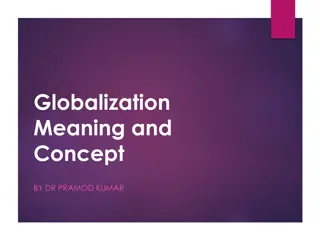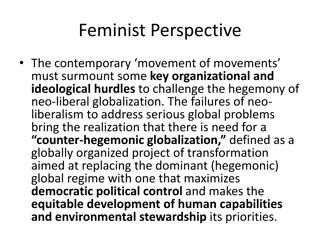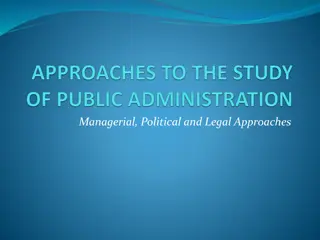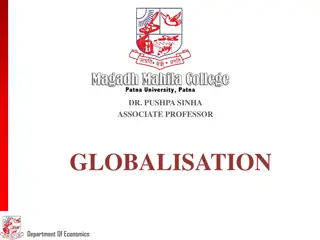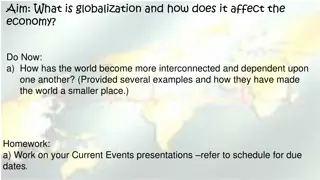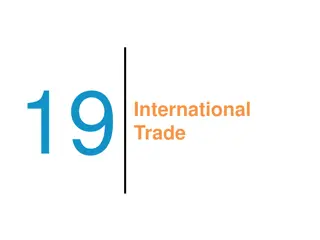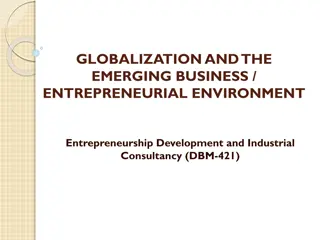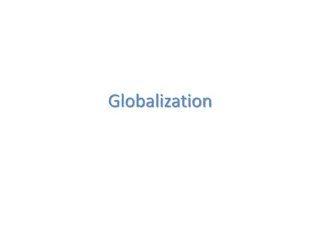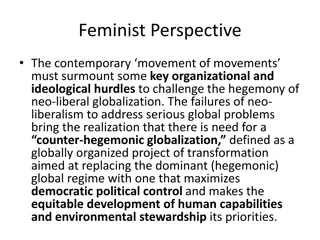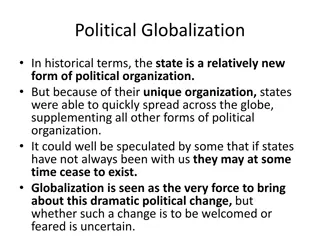Globalization and Managerial Awarenes
Globalization involves managers being conscious of financial implications for their company's future, emphasizing the importance of understanding foreign exchange rates, international technology advancements, and cultural diversity. The process encompasses stages like exporting, international licensing, and joint ventures, impacting decision-making for companies with global operations. Managers need to be aware of international environmental forces such as political and legal systems when dealing with foreign subsidiaries and global sourcing activities.
Download Presentation

Please find below an Image/Link to download the presentation.
The content on the website is provided AS IS for your information and personal use only. It may not be sold, licensed, or shared on other websites without obtaining consent from the author.If you encounter any issues during the download, it is possible that the publisher has removed the file from their server.
You are allowed to download the files provided on this website for personal or commercial use, subject to the condition that they are used lawfully. All files are the property of their respective owners.
The content on the website is provided AS IS for your information and personal use only. It may not be sold, licensed, or shared on other websites without obtaining consent from the author.
E N D
Presentation Transcript
Globalization is the process of managers becoming aware of financial activities on the future of their company. Globalization is a continuous process; Manger always try to cope with the changes Basic level of globalization is that the domestic company manage must know change in the foreign exchange rate. Manager must know about then international technological advances.
Information about the cultural diversity. Must know about the political, economical and cultural issues. The complete knowledge of all the above mentioned issues have a great impact on the capability of mangers.
Globalization includes a series of stages. It starts with exporting process. (process of selling goods and services to foreign customer). International Licensing It is an agreement between companies and foreign parties. This agreement allows the use of patent, trademark , technology, design and process etc for a fee.
A company own by two or more people from different countries. For Example: Pakistan and China made Jet airplanes by Joint Venture. If one country cant meet the needs individually then the other country can help them. It benefits the country to minimize the cost.
When a company purchases 100% control over foreign subsidiaries. OR When a company uses its own funds to create 100% equity control over foreign subsidiaries. Global Sourcing: When a company starts a) manufacturing b)Marketing c)research and development. Manager must know about the accounting information.
The manager of international companies as a need of fulfilling strategic objectives need to understand how international environmental forces affect the accounting information measured and difficulties faced by the managers. There are four environmental forces. Political and Legal System: When a manager operates in foreign setting.
He must attempt to manage the political and legal situation. A) Political Risk: Manager must examine the political risk while started operation in any country. Political risk occurs when the Govt. shift ownership of assets from company to the Govt. When the Govt take control of all assets of the company in that country. E.g, in 1970 Iran took all industries in his custody, Due to this risk manager can t collect accounting information.
It is a part of political system. In NAFTA (Political agreement Stands for North America free trade agreement. Regional value is a condition means the member countries of NAFTA are provided favorable tariff, custom, taxes services etc. Agreement between the countries if buying and selling is done with in the countries involved in the agreement, they are provided services of customs etc.
Accountant must know about the countries who are involved in the trade agreement and law of that country musty also be examined. A manager must collect any political of country and examine the trade agreement. Capital: A manager issue equity shares when he wants to open industry or any company in the foreign country whose currency is strong and stable. E.g. USA
In low capital countries the Govt. and the banks provide capita to start the business. E.g. Sudan The procedure for acquiring capital is different with in different countries. Foreign Trade zone: The areas in the country where tariff, taxes are not charged. The manager should examine the trade before launching a new product.
When a company sell its securities in the foreign stock market. The manager must examine whether they sell their shares in stock market of that country or not. F) Harmonization of Accounting Standards: Usage of methods/procedure of accounting in the foreign country Manage must know whether standard of both countries are same or not and the procedures of accounting are same as they are performing in their own country. F) Harmonization of Accounting Standards:
Market economics and Planned economics Capitalist, Socialist and communist Cultural system Think of culture as the mental mindset that affects the way individuals in a society act and perceive each other actions. US cultural practices have significant affects on the foreign companies conduct business in US Cultural system
Like wise certain forms of advertising, methods of acquiring business, and the hierarchical organizational structures which are common practice in US would not be acceptable in some international settings. Cultural differences mandate that companies wishing to do business in diverse cultural settings invest in training for their current employees, hiring new employees or both. Ignoring cultural vales can create problem later. E.g.. Pakistan Telecom companies
Individualism and Collectivism The maintains collectivism. considered to score higher on collectivism then the US. Uncertainty avoidance: The extent to which the member of society feel uncomfortable or threatened by unknown or uncertain situation. high interdependence among Asian that society implies typically the countries individuals are Uncertainty avoidance:
With a long term orientation maintain order and lasting relationships are valued. While a short term focuses on past present and ignores the future and value personal stability. Large VS small power distance: Large power distance cultures accept unequally distributed power with in and across institutions and organizations. The idea that every one is created equal and or should have equal voice is more highly valued in small power distance societies.
Training and educational differences further complicate global business through variation in infrastructure educational level and ability to transform information and knowledge b/w and among various geographic locations and people. The above differences can significantly create barriers to successful operations.
Poor access to communication equipment. Eg. Telephone fax. Foreign currencies and Exchange rate The rate at which we convert our home amount into foreign currency amount. This process of restating an amount of foreign currency in terms of the equivalent number of dollars is called translating the foreign currency. Hedging: The practice to minimize the loss confronted during foreign currency exchange.
Established in 1976 and has implications in accounting for two reasons. Record keeping and internal control procedure. The act requires that all payments including the improper payments must all be recorded and disclosed. The act requires an adequate system of internal control that maintains the integrity of company assets allowing only authorized personnel to access them.
Companies engaging in globalization must ensure that their cross border employees must comply with the FCPA
